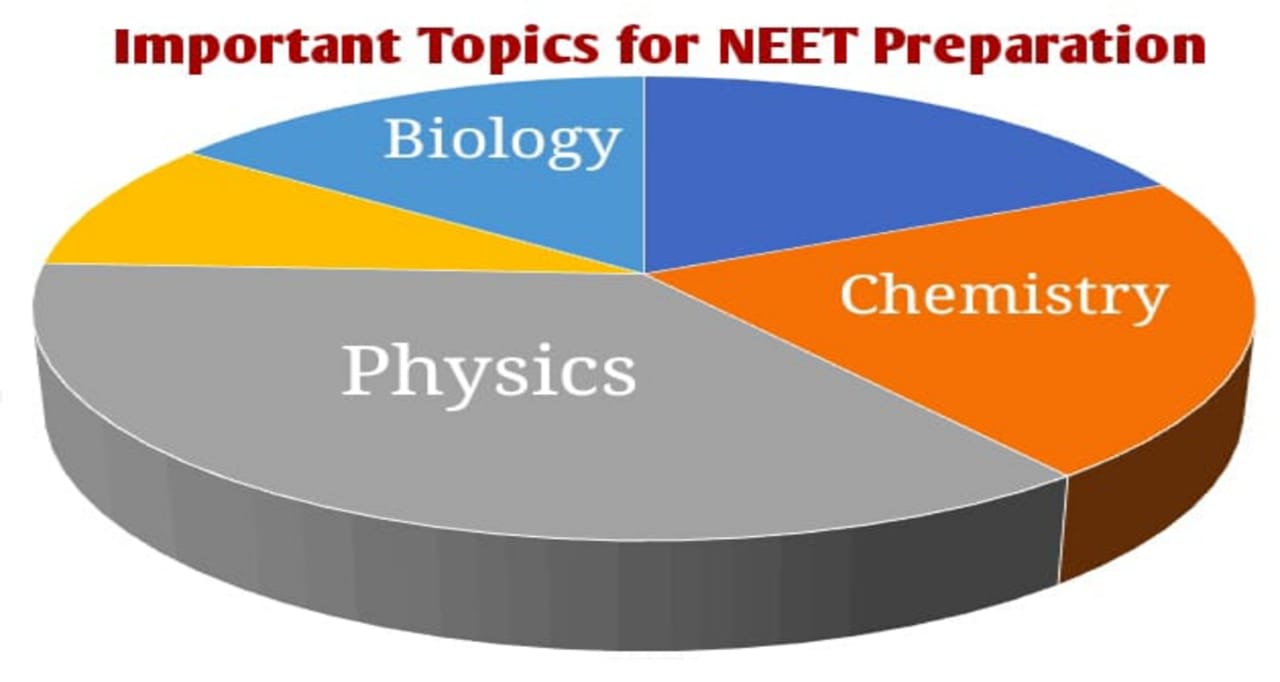Important Topics for NEET Preparation- Physics, Chemistry and Biology

Important Topics for NEET Preparation- Physics, Chemistry and Biology
The National Eligibility cum Entrance Test, though you more commonly refer to it as NEET, well if you’re preparing for it, you could go for two ways, one with the learning every gibberish you find in book, and second with learning what really matters on the exam day. So, while you're with us we have compiled all the important Topics that you might expect to see on the final war.
Know your chances in MCC/State Level Counselling as per your NEET All India Rank, Register Here or call 9310476673/9310486685
Interested in MBBS from Philippines/Nepal? for details call 9310476673/9310486685
Start your NEET Preparation with Best Kota Faculty, Get (Live Zoom classes, Test Series, Recorded Lectures, DPP's and more) + Personalized Mentorship (Strategy Sessions) for NEET for details call 9310476673/9310486685
While preparing for such a highly competitive examination like NEET a student must always prepare smartly as well along with all the hard-work because the syllabus for this examination is huge and includes Class 11th and 12th Syllabus of Physics, Chemistry and Biology. To score well in the examination the student must know which topics to focus more on and which to be taken normally while preparing for NEET.
Here below there are Important Topics listed for NEET Preparation in each of the 3 sections namely Physics, Chemistry and Biology respectively:
Important Topics for NEET Preparation – Physics :
Physics is one of the 3 sections in NEET and carries a weightage of 180 Marks in the NEET Question Paper. Below are the listed average number of questions that have been asked from the Important Topics of various Units and Chapters of Physics from Class 11th and Class 12th respectively.
Expected Unit Wise and Chapter wise number of questions in Physics:
|
Chapter’s Name |
Average Number of Questions |
|
|
Physical World and Measurement |
Physical World and Units and Measurement |
1 |
|
Kinematics |
Motion in Straight Line |
2 |
|
Motion in a Plane |
1-2 |
|
|
Laws of Motion |
Laws of Motion |
2-3 |
|
Work, Energy and Power |
Work, Energy and Power |
2 |
|
System of Particles and Rotational Motion |
System of Particles and Rotational Motion |
2-3 |
|
Gravitation |
Gravitation |
2 |
|
Properties of Bulk Matter |
Mechanical Properties of Solids |
1 |
|
Mechanical Properties of Fluids |
1 |
|
|
Thermal Properties of Matter |
1-2 |
|
|
Oscillations and Waves |
Oscillations |
1-2 |
|
Waves |
1-2 |
|
|
Thermodynamics |
Thermodynamics |
1-2 |
|
Behaviour of Perfect Gas and Kinetic Theory |
Kinetic Theory |
1 |
|
Electrostatics |
Electric Charges and Fields |
1-2 |
|
Electrostatic Potential and Capacitance |
1-2 |
|
|
Current Electricity |
Current Electricity |
4 |
|
Magnetic Effects of Current and Magnetism |
Moving Charges and Magnetism |
2 |
|
Magnetism and Matter |
1 |
|
|
Electromagnetic Induction and Alternating Currents |
Electromagnetic Induction |
1 |
|
Alternating Currents |
1 |
|
|
Electromagnetic Waves |
Electromagnetic Waves |
1 |
|
Optics |
Ray Optics and Optical Instruments |
2 |
|
Wave Optics |
1 |
|
|
Dual Nature of Radiation and Matter |
Dual Nature of Radiation and Matter |
2-3 |
|
Atoms and Nuclei |
Atoms |
1-2 |
|
Nuclei |
2 |
|
|
Electronic Devices |
Semiconductor Electronics |
3 |
|
Communication Systems |
Communication Systems |
0 |
*Please Note: The above estimation of number of questions is based upon the number of questions asked from each Topic in NEET from 2020 to 2009 (Including AIPMT).
Important Topics for NEET Preparation – Chemistry:
Chemistry is one of the 3 sections in NEET and carries a weightage of 180 Marks in the NEET Question Paper. Below are the listed average number of questions that have been asked from the Important Topics of various Units and Chapters of Chemistry from Class 11th and Class 12th respectively
Expected Unit Wise and Chapter wise number of questions in Chemistry:
|
Chapter’s Name |
Average number of Questions |
|
Hydrogen |
1 |
|
s-Block Element (Alkali and Alkaline earth metals) |
2 |
|
Some p-Block Elements |
1 |
|
Chemical Bonding and Molecular Structure |
3 |
|
Classification of Elements and Periodicity in Properties |
1 |
|
General Principles and Processes of Isolation of Elements |
1 |
|
p- Block Elements |
2-3 |
|
d and f Block Elements |
2 |
|
Coordination Compounds |
2 |
|
Environmental Chemistry |
1 |
|
Organic Chemistry- Some Basic Principles and Techniques |
1-2 |
|
Hydrocarbons |
3 |
|
Haloalkanes and Haloarenes |
2 |
|
Alcohols, Phenols and Ethers |
1-2 |
|
Aldehydes, Ketones and Carboxylic Acids |
2-3 |
|
Organic Compounds Containing Nitrogen |
1 |
|
Biomolecules |
2 |
|
Polymers |
1-2 |
|
Chemistry in Everyday Life |
1 |
|
Some Basic Concepts of Chemistry |
1-2 |
|
Structure of Atom |
2 |
|
States of Matter: Gases and Liquids |
1 |
|
Thermodynamics |
2 |
|
Equilibrium |
2-3 |
|
Redox Reactions |
1 |
|
Solid State |
1-2 |
|
Solutions |
2 |
|
Electrochemistry |
2 |
|
Chemical Kinetics |
2 |
|
Surface Chemistry |
1 |
*Please Note: The above estimation of number of questions is based upon the number of questions asked from each Topic in NEET from 2020 to 2009 (Including AIPMT).
Important Topics for NEET Preparation- Biology
NEET Examination is of Total 720 marks out of which 50% or 360 Marks are allotted to Biology alone. The Biology Section Topics are mainly divided among Botany and Zoology. Here below you can find the average number of questions expected in NEET Unit wise and Chapter wise from Class 11th and 12th Biology Syllabus.
Expected Unit Wise and Chapter wise number of questions in Biology:
|
Name of Unit |
Chapter’s Name |
Average Number of Questions |
|
Diversity in the Living World |
The Living World |
1 |
|
Biological Classification |
3-4 |
|
|
Plant Kingdom |
3 |
|
|
Animal Kingdom |
3-4 |
|
|
Human Physiology |
Digestion and Absorption |
2 |
|
Breathing and Exchange of Gases |
2 |
|
|
Body Fluids and Circulation |
2 |
|
|
Excretory Products and their Elimination |
2 |
|
|
Locomotion and Movement |
1-2 |
|
|
Neural Control and Coordination |
2 |
|
|
Chemical Coordination and Integration |
3 |
|
|
Plant Physiology |
Transport in Plants |
1-2 |
|
Mineral Nutrition |
1-2 |
|
|
Photosynthesis in Higher Plants |
2 |
|
|
Respiration in Plants |
1 |
|
|
Plant Growth and Development |
1-2 |
|
|
Structural Organisation in Animals and Plants |
Morphology of Flowering Plants |
3-4 |
|
Anatomy of Flowering Plants |
3 |
|
|
Structural Organisation in Animals |
2 |
|
|
Cell Stucture and Functions |
Cell : The Unit of Life |
3-4 |
|
Biomolecules |
2 |
|
|
Cell Cycle and Cell Division |
2 |
|
|
Biology and Human Welfare |
Human Health and Disease |
3-4 |
|
Strategies for Enhancement in Food Production |
2-3 |
|
|
Microbes in Human Welfare |
3 |
|
|
Biotechnology and its Applications |
Biotechnology : Principles and Processes |
2-3 |
|
Biotechnology and its Applications |
2 |
|
|
Ecology and Environment |
Organisms and Populations |
2 |
|
Ecosystem |
2-3 |
|
|
Biodiversity and Conservation |
2-3 |
|
|
Environmental Issues |
3 |
|
|
Genetics and Evolution |
Principles of Inheritance and Variation |
5-6 |
|
Molecular Basis of Inheritance |
4 |
|
|
Evolution |
3 |
|
|
Reproduction |
Reproduction in Organisms |
1-2 |
|
Sexual Reproduction in Flowering Plants |
3-4 |
|
|
Human Reproduction |
3-4 |
|
|
Reproductive Health |
2 |
*Please Note: The above estimation of number of questions is based upon the number of questions asked from each Topic in NEET from 2020 to 2009 (Including AIPMT).
The Eligibility Criteria is important for any examination because even if a candidate does not fulfil a single criterion of the eligibility criteria declared for the examination then the candidate is not allowed to appear for the examination or even after appearing for the examination and clearing the same the admission through the examination stands cancelled or void.
The NEET Eligibility Criteria in detail are as follows:
Age limit:
- Candidate should have completed 17 years on or before 31st December 2021. Upper age limit will be 25 years.
Nationality:
- Indian National/NRIs/PIO/OCI and foreign national all are eligible to apply.
Qualification:
- The candidate must have passed class 12th or equivalent from any recognized board.
- Candidate must have passed in Physics, Chemistry, Biology/Biotechnology and English individually with minimum 50% marks.
- For SC/ST marks relaxation is 40% and for PwD marks relaxation is 45%.
The NEET Exam Pattern is important to read for every student who wishes to appear for it. The NEET Exam Pattern gives a clear idea to the student about the type of questions, exam duration exam language and various other important details about the examination.The NEET Exam Pattern also helps in the planning of preparation for the examination and successfully clearing the same .
NEET is a National Level Exam conducted by NTA (National Testing Agency) for those candidates who are interested in the medical field. In early stage of preparation, candidate should know about each and every point of exam pattern. With the help of this exam pattern student will get idea about duration of exam, marking scheme, no. of question, etc.
NEET Exam Pattern Overview:
|
Particulars |
Details |
|
Mode of Exam |
Pen and Paper based |
|
Duration of Exam |
3 hours |
|
Subjects |
|
|
Type of Questions |
MCQ’s |
|
Total Question |
180 |
|
Total Marks |
720 |
|
Negative Marking |
-1 will deducted for wrong answer marking |
|
Language of Exam |
English, Hindi, Assamese, Bengali, Gujarati, Kannada, Marathi, Odia, Tamil, Telugu and Urdu. |
NEET Exam Pattern in Detail:
|
Subjects |
No. of Questions |
Marks per Question |
Distribution of Marks |
|
Physics |
45 |
4 |
45*4 = 180 |
|
Chemistry |
45 |
4 |
45*4 = 180 |
|
Biology (Botany and Zoology) |
90 |
4 |
90*4 = 360 |
|
Total |
180 Question |
|
720 Marks |
NEET Marking Criteria:
|
Marking Criteria |
Correct Answer |
+4 |
|
Incorrect Answer |
-1 |
|
|
Unanswered |
0 |
Note: Candidates are advised not to attempt the multiple answers during the NEET exam as it will cost them negative marking.
Exam Timeline
|
NEET Application Form |
Tentatively 1st week of May to 1st week of July |
|
NEET Admit Card |
Tentatively 2nd or 3rd week of July |
|
NEET Examination |
Tentatively 1st or 2nd week of August |
|
NEET Result and Final Answer Key |
Tentatively 1st or 2nd week of September |
|
NEET Counselling and Admission Procedure |
Tentatively September to November |
About Author
Harshita Nandal
Harshita Nandal has worked as a Creative head in Mitrakshar, University of Delhi. She has done her Graduation from the University of Delhi in English Honours. In her free time, she prefers to play the guitar, take short walks in between work and loves to watch Korean dramas. Currently, she is an author at Educere India to fulfil the desire of her passion for writing.







